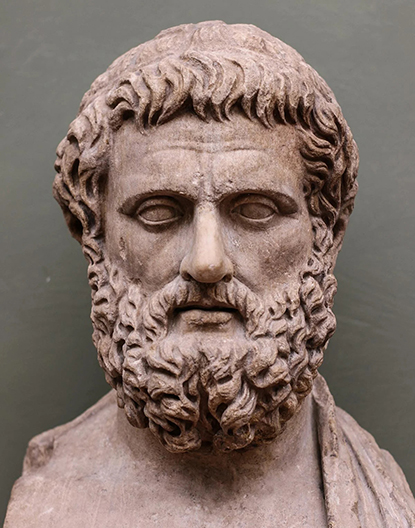Dramaturgical Resources
2024
Oedipus
By Sophocles (adapted by Jo Cattell from a new translation by Robert Bagg)
Over the course of the season, our assistant directors and student dramaturgs will be compiling dramaturgical resources relating to each production as it develops. Below are some links to websites which relate to the history of the play, the biography of the playwright, and sites that contextualize and, we hope, shed light on the directorial approach to the dramatic material.
We hope you find these resources of interest.


Sophocles (496 BCE - 406 BCE) Robert Bagg (b.1935)
Sophocles was the pre-eminent Athenian playwright of the fifth century. He wrote over 120 plays, though only 7 have survived. Ajax, Antigone, Women of Trachis, Electra, Philoctetes, Oedipus at Colonus, and Oedipus, also known as Oedipus Rex (to distinguish it from Oedipus at Colonus) or by its English title, Oedipus the King.
Oedipus the King is a tragedy and part of a Theban trilogy and was among the most popular plays of ancient Athens. While the order in which Sophocles’ Oedipus works were written is subject to conjecture, chronologically, in terms of their narrative, the order of the plays is Oedipus Rex, Oedipus at Colonus, and finally, Antigone. Oedipus the King play was first performed in 429 BCE.
There have been many different translations of Oedipus Rex, as well as many adaptions in all media.
The first English film adaptation was in 1957. Titled Oedipus Rex, it was directed by Tyrone Guthrie. One of the unique attributes of this adaptation was that the cast wore masks similar to the tradition of ancient Greek theater. A second film adaptation in 1968 was named Oedipus the King, directed by Philip Saville. This version dispensed with masks, embracing a more contemporary aesthetic.
Composer Igor Stravinsky was inspired by Oedipus's story, and wrote an opera-oratorio, Oedipus Rex, in 1927. The work premiered at the Théâtre Sarah Bernhardt in Paris.
There have been more recent adaptions to Oedipus’s story. Ola Rotimi not only adapted Oedipus Rex in 1968 into a play, but also into a novel, The Gods Are Not to Blame (1971). The adaptation inspired Otun Rasheed to further adapt it, in 2012, into a movie titled, The Gods Are Still Not to Blame.
One unique adaptation of the work was Martha Graham’s ballet, Night Journey in 1947. The dance did not focus on the main character, Oedipus, but instead on Jocasta and her destiny.
Our production explores immersive storytelling and site-specific theatrical methods. Immersive theater is uniquely different from traditional theater by taking away the stage and immersing the audience in the performance. This can be done by using a site-specific style and allowing audiences to talk and connect to the actors and interact with their surroundings. This incorporates a choose-your-own-adventure style of participation, as multiple scenes are taking place at the same time, allowing audience members to choose what character/story they would like to follow. This encourages audiences to see the show more than once to be able to follow each character’s unique journey.
Oedipus Rex is still taught in schools and its relevance continues as indicated by numerous adaptations and translations. It is a work filled with dramatic irony, and its themes of fate and self-determination, power and hubris continue to haunt contemporary society.
About the Translator
In 2011, Robert Bagg with James Scully translated all of Sophocles' surviving works. They are published as The Complete Plays of Sophocles by Harper Perennial.
